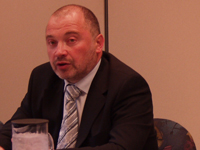Registration
You will receive an email confirming your registration.
IMGXYZ1055IMGZYXThe past three months have been a turbulent time for the Russian Federation, marked by the Russia-Georgia conflict, global financial crisis, and U.S. presidential elections. While the government’s response to these events has done little to positively change the domestic political process, Nikolai Petrov concluded that the government’s response illustrates that modernization from above will not occur in Russia.
Petrov elaborated on the ramifications of a number of domestic policies enacted in response to recent events.
Medvedev’s First Annual Address
In the tailspin of world coverage of Barack Obama’s presidential victory, Medvedev gave his first annual address. According to Petrov, the speech seemed outdated and a mish mash of good words and bad ideas. Although the speech could have served as a way to thoughtfully address the impacts of the Russia-Georgia conflict and the financial crisis, it mainly offered an anti-American stance and numerous superficial political changes along with the idea of extending presidential term limits to 6 years.
The Financial Crisis
According to Petrov, one of the gravest challenges facing Russia in its effort to overcome the financial crisis is Putin's inability to accept and understand that both he and his government made mistakes. The situation is made grimmer by the fact that Russia's centralized political management system is not a good mechanism for dealing with today’s financial crisis. The situation will be further aggravated when the government stops focusing on the problems of large national banks and turns to the hundreds of small national and regional banks in trouble. Today’s economic problems are likely to affect the middle class and will likely contribute to social upheaval. This is particularly dangerous because Russia’s political process rests solely on Putin’s popularity rating.
Russia’s Regions
Petrov explained that Russia’s regions are being negatively affected in a variety of ways. One problem is that there are personnel cut-offs in many industries and across many regions. Federal policy has been ineffective in addressing this issue. Additionally, the federal government’s promise to increase salaries for federal workers has driven many regional leaders to ineffectively follow suit. In order to keep pace with federal salary increases and in light of the economic downturn, regional leaders are forced to layoff staff. Finally, the North Caucuses are likely to grow more problematic as the likelihood that they will begin to call for independence increases and the violent conflict that has already begun deepens.
